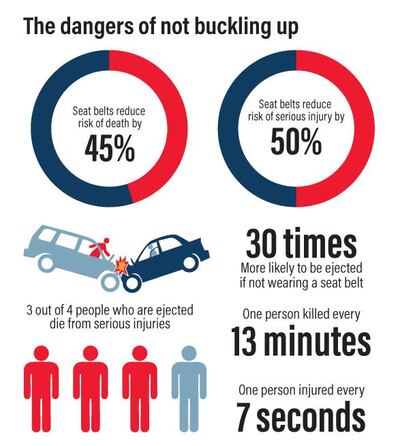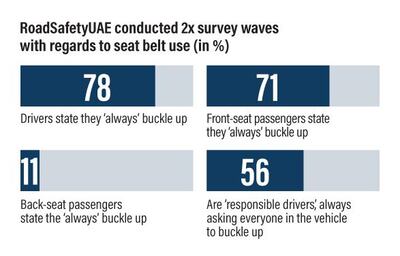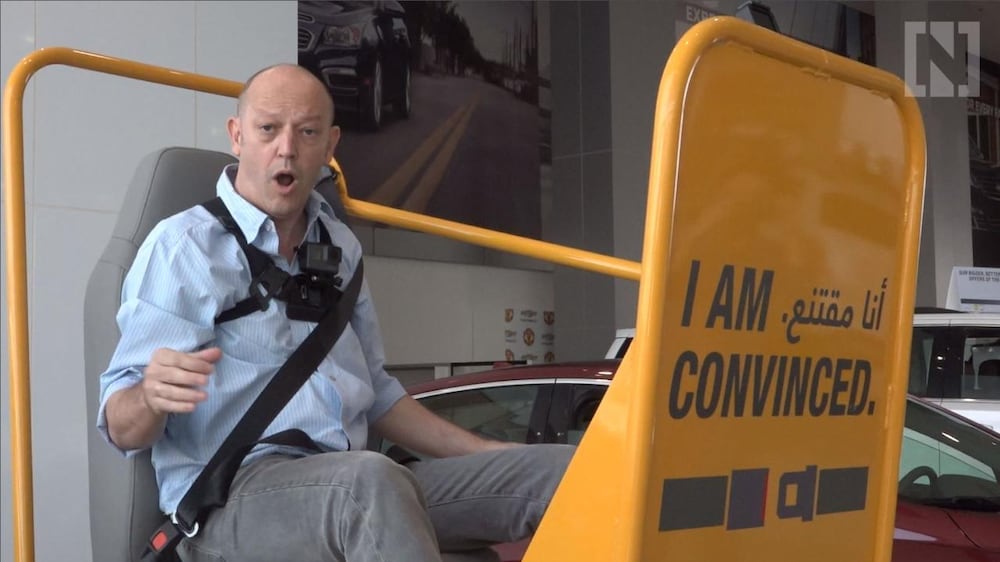Passengers are to be shocked into action as part of a new campaign to encourage more people to buckle up on the nation’s roads.
Taxi hailing service Careem has teamed up with car dealership Al Ghandi autos and Road Safety UAE to help deliver a message to schools and businesses on the importance of wearing seat belts at all times.
Al Ghandi Auto has invested $20,000 (Dh73,400) in the ‘seatbelt convincer’ – a spring loaded sledge to replicate the impact of a low-speed collision.
Campaigners will use the device at open days around the UAE to show the physical importance of buckling up in moving traffic.
“When driving around Dubai, it is clear to see not everyone is wearing a seat belt, It’s quite disheartening,” said David Russell Devine, from Al Ghandi Auto.
“It is slowly changing, but not enough has been done up to now to enforce that change. You can see taxi drivers, van drivers and business men on the roads using their mobile phones.
“There is clearly room for improvement.”

The ‘seat belt convincer’ will be touring schools, colleges, carnivals and businesses to help promote the wearing of seat belts at all times on the road.
Gems schools will be the first to experience the seat belt convincer with pupils and teachers offered the chance to experience what it feels like to be involved in a low speed car crash.
It has partnered with tax hailing app Careem to help promote the wearing of seatbelts amongst all its passengers and drivers.
Pakistani driver Parvaiz Akhtar has been on the roads of the UAE for 31 years, and said some road users are clearly flouting the law.
“When you know it is a test like this it is not a problem. When you are not expecting it – a collision like this is a big problem and quite frightening,” he said.
“I’ve had no big accident in my time here, thanks to God, but I have seen many.”
Mr Akhtar was the private driver for a fleet of expensive vehicles for 25 years before taking a job with Careem.
“Even this morning I witnessed a serious crash between two cars,” he said.
“Both vehicles were seriously damaged and one car had to be cut open, it was shocking to see.
“When my passengers don’t want to wear a seatbelt I explain to them it is safety for them, their family and for me.
“I also explain there is a rule now that will mean I will be fined. Most passengers listen and fasten up.”
_______________
Read more:
[ Red road markings on Sheikh Zayed Road to warn speeders in Dubai ]
[ Almost 400 motorists fined for running red lights in Ras Al Khaimah ]
[ Law needed to ensure lorry drivers are not 'dangerously overworked' ]
________________
Ahmed Nawaz, 29, from Pakistan, has been driving limousines for three years in Dubai.
“I had a big accident four years ago when I was driving a van,” he said.
“It made me realise how important a seatbelt is.”
Mr Nawaz was driving on Sheikh Mohammed bin Zayed Road travelling at about 140kph when his car tyre suffered a blow out.
He was forced into the middle lane after clipping the central reservation. Luckily there were no other cars inside him, and he was wearing a seatbelt so escaped with only minor injuries.
“I had a bang on my head as I touched the windscreen, but it could have been a lot worse,” he said.

“My van was totally destroyed. It was very scary. I now wear a seatbelt all the time, even when I’m driving at just 1km an hour.
“I tell my passengers to buckle up, and about the new fines that are in place. I have seen a slight change in the way people drive, but it can improve for sure.”
According to a 2017 research project carried out by Road Safety UAE, just 11 per cent of back-seat passengers said they always wore seat belts.
Just 51 per cent of Emiratis who were questioned said they wore seat belts, and only 52 per cent of young people aged 18-24 belted up when passengers in vehicles.
The survey also found almost a quarter of all passengers asked never wore a seat belt, and one in three didn’t use a child safety seat.







